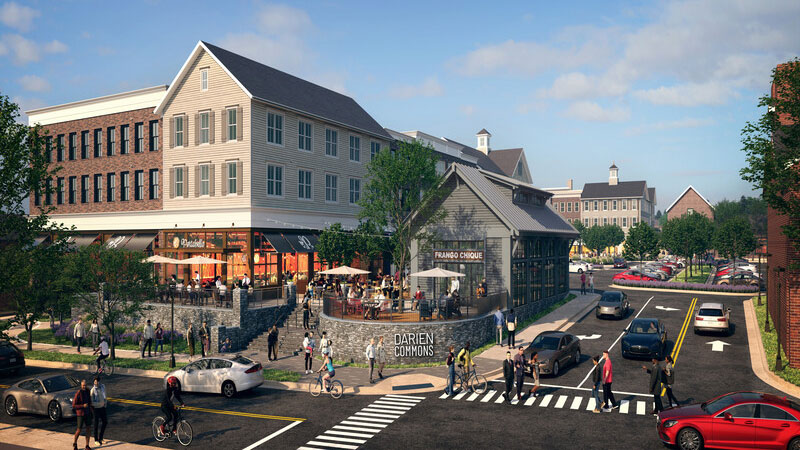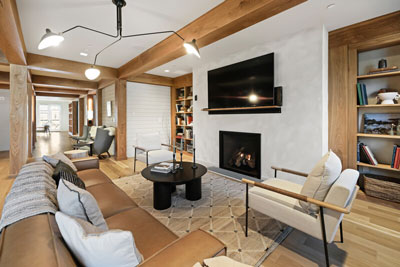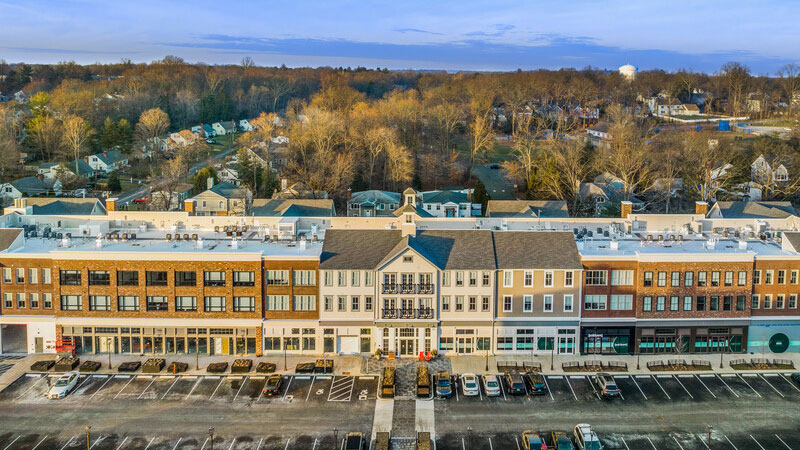Federal Realty Investment Trust’s (NYSE: FRT) new mixed-used project in the Noroton Heights neighborhood of Darien, Connecticut is turning a 1960s-era shopping center into an amenity-rich, vibrant new community that benefits from easy access to New York City.
Darien Commons has all the hallmarks of the REIT’s development strategy: Take a well-located shopping center in a market with strong demographics, nearby transit and highway access, and high barriers to entry, and where the market demands it, then redevelop and reposition it with housing and/or office, and local and new-to-market retailers and restaurants to create a pedestrian-oriented neighborhood. Similar, albeit larger-scale, examples can be found at Federal Realty’s Assembly Row near Boston and Pike & Rose in North Bethesda, Maryland.
In the case of Darien Commons, that equates to a new 120,000-square-foot asset that features 75,000 square feet of new retail space, 122 second and third-story apartments, and a small amount of office space. It also means improving two longtime tenants by moving Walgreens into a new space and helping Equinox gym make exterior upgrades.
Federal Realty delivered 58 units of its multifamily portion of the roughly $115 million project in October 2022 above one retail building, and it expects to open the balance in a second building by the end of January. It has also signed several tenants that are in various stages of construction, and a few will begin opening in the coming days. Tenants to commit to the project so far include Warby Parker, Choice Pet, Salt & Sweat wellness studio, and One Medical, a membership-based primary care practice. Gregory’s Coffee, Pizzeria Molto, Sweetgreen, Seamore’s, Tartinery, and Naya are among the cafés and restaurants opening in the project.
“We wanted to combine the residential component of Darien Commons with what I would call an elevated-daily-needs type of retail center,” says Stuart Biel, a senior vice president with Federal Realty in charge of leasing and merchandising for the REIT’s mixed-use and large-scale redevelopments in the Eastern region.
“We already had traffic coming in multiple times a week to the Walgreens and Equinox, so we were really starting with the benefit of the muscle memory built into people’s routines. When you build a new project, creating that muscle memory can sometimes be the hardest thing to do,” he adds
Reimagining a Neighborhood
Darien Commons is a project that has been in the works going on eight years. Federal Realty acquired the roughly 95,000-square-foot shopping center in 2013 with an eye toward redeveloping it, and started the planning phase in 2015, explains Patrick McMahon, senior vice president of regional development at Federal Realty. The property dates back to the 1960s when it was anchored by a Stop & Shop grocery.
“Grocery-anchored retail is certainly what we do, and being built in the 1960s, the property was exactly what you would envision when thinking about a shopping center of that era,” says McMahon, who is responsible for Federal Realty’s development pipeline in the Northeast. “It was automobile-oriented with surface parking surrounding the shopping center. And candidly, there was not a lot of investment made into the asset over its lifecycle.”
Federal Realty began planning the redevelopment in 2015, McMahon adds. At around the same time, the Darien Planning and Zoning Commission was performing a required 10-year update of the Town Plan of Conservation & Development master plan for the city. Among other areas of focus, officials prioritized transforming the strip center-oriented Noroton Heights business district—a roughly half-mile stretch that generally encompasses Federal Realty’s property and another shopping center to the west—into a pedestrian-friendly, mixed-use neighborhood.
After securing entitlements and permits, Federal Realty began construction in December 2019, demolishing 45,000 square feet of anchor space. Because much of the work in 2020 focused on site improvement, Federal Realty did not experience a work stoppage or slowdown during the COVID-19 lockdowns, McMahon says. Upon completion of two new retail and residential buildings, the REIT anticipates reaching stabilization this year and a return on investment of 6%.
“Because it’s a market with high barriers to entry, we don’t see a lot of competitors coming in the future,” McMahon says. “But it also made up for a lack of quality apartment offerings in the immediate area. Until our project, there had been no institutional market-rate multifamily built in over 10 years.”
Federal Realty is also drafting architectural plans to renovate some 6,300 square feet of second-story office space above the existing Citibank building to cater to office employees who are no longer going into the office five days a week, including commuters to New York. But Biel suggests that the project’s coffee shops and restaurants will attract the remote workers who are looking for a change of scenery, as well.
“Darien is a great place and lifestyle if you need that proximity to the city but now are only going in two or three days a week,” Biel says. “You still want to have a cup of coffee somewhere and bring your laptop for a business meeting. Or you want to go to Equinox to work out in the middle of the day. I think the project will be a big beneficiary of those shifts.”
Darien Commons has been an influential and welcome improvement to the Noroton Heights business district, says Jeremy Ginsberg, Darien’s director of land use. The project has also added 16 units to the city’s affordable housing stock, he adds.
“When you look at the work that Federal Realty has done in terms of sidewalks, road improvements, stormwater improvements, and pedestrian access, it will be a great benefit to the Noroton Heights neighborhood and the town in general,” he says. “They have added a larger variety of commercial uses, too. There were no restaurants on that block previously, so there will be a little more night life there, if you like.”
Appealing Community Characteristics
Two principal features that attracted Federal Realty to the Darien Commons site were transit and demographics. The development is just north of the Noroton Heights train station, and about a 40-minute ride to Manhattan’s Grand Central Station on the Metro-North New Haven line, McMahon points out. Access to Interstate 95 is close by, too.
In the recent past, the Connecticut Department of Transportation replaced deteriorating train platforms, and city leaders would eventually like to further renovate and expand the Noroton Heights station to leverage the new mixed-use, transit-oriented development taking place across the street, Ginsberg says.
The connection to New York goes beyond Noroton Heights’ proximity to the city and the commuter line. Federal Realty is mining retailers and restaurants that have established themselves in New York and are in expansion mode. To date, those include Van Leeuwen Ice Cream, which began out of a truck in New York City in 2008, Gregory’s Coffee, which was founded in 2006 and roasts its beans in Long Island City, and Tartinery café and bar, which was opened in 2010 by a native Parisian.
“Urban-centric New York brands that are looking to expand in these first-ring suburbs have shown a lot of interest here,” Biel says. “They are realizing that the work-life balance and routines for many people have changed, at least in the medium term and potentially longer.”
Meanwhile, a population of 105,600 live within three miles of Darien Commons, and the annual median household income is more than $109,000. The median home value within that radius is north of $585,000, and nearly 60% of the population has a college undergraduate or graduate degree.
“There is a consistency to the level of demographics in other communities where Federal Realty has done business, whether that’s in Bethesda, Maryland, in Wellesley, Massachusetts, or in Los Gatos, California,” Biel says. Indeed, according to a recent Federal Realty earnings presentation, the average median income surrounding its centers is almost $110,000, and only 10% of its gross leasable area is exposed to households with less than $75,000 in annual median income.
“Darien’s also not a town that’s ever going to have a lot of new development going on,” he adds. “So, it fits much of what we’re looking for. You've clearly got a well-heeled customer base, and we think they're going to appreciate the investment we're making here."


